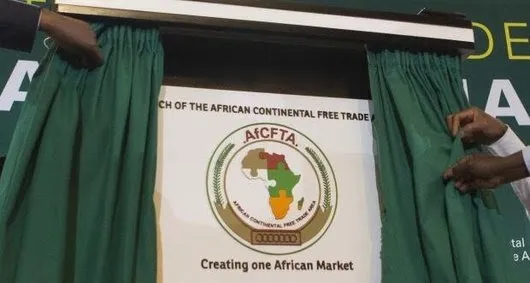The Ghana Ports and Harbours Authority (GPHA) has assured the Ghanaian trading community that the country’s seaports are ready for Africa’s trade integration agenda through the African Continental Free Trade Area (AfCFTA).
Mrs Florence Essel, GPHA Assistant General Manager of Administration said the port authority could confidently assure Ghanaians and others from the African continent that it was positioning itself to grab the opportunities AfCFTA would bring to the fore.
She said, “Therefore, GPHA sees AFCFTA as a great opportunity to continue to invest in the infrastructure required to propel the economy for the future.”
Mrs Essel stated this at the 12th monthly stakeholder engagement seminar organized by the Ghana News Agency Tema Regional Office which is a platform rolled out for state and non-state actors to address national issues.
Mrs Essel said GPHA continued to ensure that Ghana’s ports were well-positioned to serve as the leading trade and logistics hub in the sub-region, and it, therefore, was excited by the AfCFTA.
She added that as AfCFTA sought to open up trading for African countries to trade amongst themselves, the ports remained key for the transportation of goods among the countries.
She said it was a well-known fact that Intra African trade was the lowest among its peers in the world and AfCFTA had an objective to reverse the perennial disadvantage to the benefit of the African Ports.
The GPHA Assistant General Manager, in charge of Administration, said the ports within the continent had the opportunity to grow their exports, imports, transit, and transhipment traffic with the advent of the free trade area.
This, she said meant more revenue to the ports and also a boost for the economy of the member countries, adding that when the benefits of AFCFTA begin to manifest, markets would expand, factories would produce more, and it would translate into the ports getting busy.
Mrs Essel explained that when it came to international trade, seaports and shipping served as the most competitive conduit for the carrying of goods.
She said seeing the relevance of AfCFTA to the ports, her outfit had engaged the secretariat actively and was playing a key role in educating the public and stakeholders on it.
Touching on infrastructural development at the Ports, she said the completion of phase two of the Terminal three at the Tema Port had boosted the capacity of the Port to handle larger vessels with 16meters draft.
Mrs Essel said their dedicated container terminal, also known as the MPS Terminal three was currently the biggest in terms of capacity among all ports in West and Central Africa, adding that the terminal was being complemented by the ongoing expansion of the Takoradi Port.
“The construction of the multipurpose Atlantic Terminal, with 16-meter depth, will position the Atlantic Terminal and the Port of Takoradi at a competitive advantage in the port and maritime industry, especially with the Port of Abidjan because of its ability to receive the largest container vessel,” she added.
She stated that World-class equipment including ship to shore cranes and mobile harbour cranes would be procured to equip the Terminal, indicating that the completion of the liquid bulk Terminal, the dry bulk jetty with conveyor systems, and the pending oil and gas services Terminal would position the country’s ports to take advantage of the AFCFTA.
“Because without this modern equipment and infrastructures our efforts to facilitate trade and take full advantage of this continental initiative will be a mirage.”
GPHA, she said was sensitive to transit trade and has been embarking on trade missions to the sub-regional landlocked countries to seek their opinion on how to make the transit trade better.
Mrs Essel added that they had also offered the transit partners favourable storage terms making Ghana’s ports attractive to them to continue doing business with the country even before the full operation of AfCFTA.











